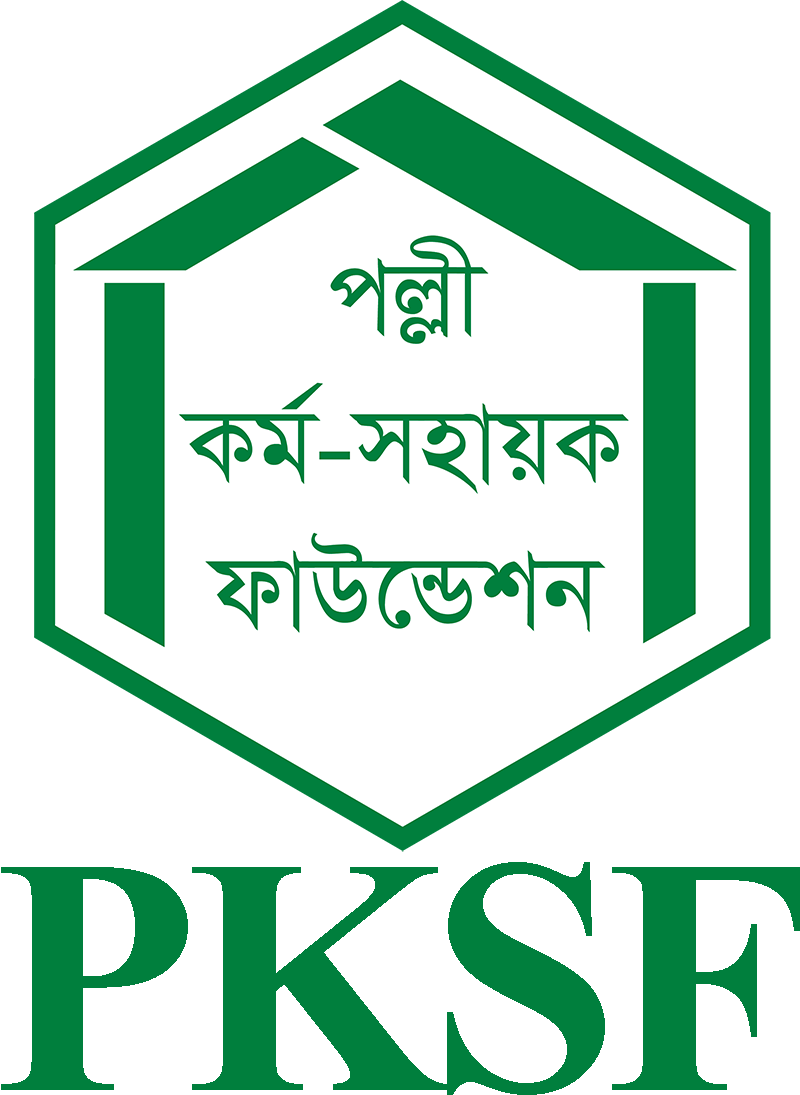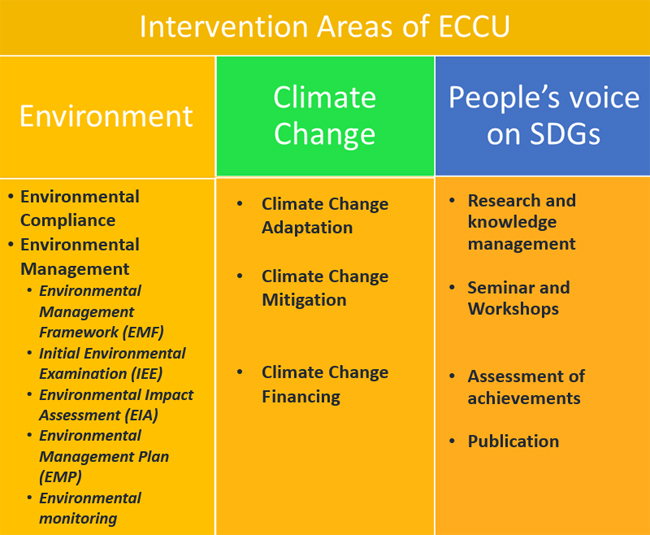Environment and Climate Change Unit (ECCU)
The impacts of climate change and dealing with them effectively are matters of immense importance globally. National and international communities are working together to combat the effects of climate change. International initiatives in this regard include the United Nations Framework Convention on Climate Change (UNFCCC), Kyoto Protocol, Paris Agreement, Green Climate Fund, etc. Climate change has also been given immense importance in the Sustainable Development Goals adopted by United Nations member states.
PKSF in 2016 established its Environment and Climate Change Unit with the aim of mainstreaming environment and climate change issues in all activities of PKSF. Since then, PKSF has been successfully implementing various activities at the national and the international level.
Recently, two projects titled ‘Resilient Housing and Livelihood Support to the Vulnerable Coastal People of Bangladesh (RHL)’ and ‘Extended Community Climate Change Project-Drought (ECCCP-Drought)’ have been approved by the Green Climate Fund in favor of PKSF.
The main objective of the RHL project is to increase the climate-resilience of the coastal population of Bangladesh, especially women-headed households, and the ECCCP-Drought project aims to reduce the risk of climate change-induced drought by effectively using scarce water resources in the northwestern region of Bangladesh.
Another two-year project titled ‘Climate-resilient Infrastructure for Sustainable Community Life in the Haor Region of Bangladesh’ is being implemented from 1 March 2023. The IKI Small Grants Funding Scheme funds the project under the supervision of the German government’s development agency giz.
Under the project, the activities of construction of ‘hati’ protection walls, planting of local trees and raising of community common spaces are ongoing to protect the cluster of settlements located in Haor areas of Sunamganj district from flash floods.
A GCF-funded project titled ‘Extended Community Climate Change Project-Flood (ECCCP-Flood)’ is already in the final stage of implementation under this unit.
PKSF’s Environment and Climate Change Unit is working under the GCF Readiness Support Project-02 to increase access to Green Climate Fund (GCF) financing by building institutional capacity of public and private institutions to formulate and implement climate change-related projects. Besides, a Climate Change Knowledge Hub has been established under this project to collect data related to climate change.
In addition, 15 environmental and social management guidelines – one each for mango cultivation, banana cultivation, safe vegetable cultivation, salt and dried fruit production, imitation jewelry, textile industry, footwear industry, handloom industry and waste management of livestock, environmental management of poultry farms and environmental and social management of floriculture and fish farming and environmental and social management of buffalo rearing – have already been formulated by the Environment and Climate Change Unit of PKSF in line with the relevant policies of the government.
Guidelines formulated for ensuring environmental protection have been distributed among the Partner Organizations. This unit provides necessary technical assistance on environmental and climate change related activities implemented by other programs or projects of PKSF.
Development of Environmental Management Guidelines
The ECCU of PKSF has developed a number of environmental management guidelines for microenterprises and suggested some best practices for promoting sustainable enterprises at the grassroots. The guidelines are:
• Livestock Waste Environmental Management
• Weaving Industries Environmental Management
• Footwear Industries Environmental Management
• Safe Mango Production Environmental Management
• Safe Banana Production Environmental Management
• Hygienic Dry Fish Production Environmental Management
• Safe Vegetable Production Environmental Management
• Dyeing Waste Water of Handloom Industry Environmental Management
• Imitation Jewelry Environmental Management
• Salt Production Environmental Man
Strategic Intervention Areas
GCF
Palli Karma-Sahayak Foundation (PKSF) was accredited to GCF in its 18th board meeting on 29 September to 03 October, 2017. PKSF works through national and local level NGOs largely known as Partner Organisations (POs). These organisations operates various project/programs including the project/programs relevant to climate change. In addition, various government departments and research institutes show their interest to work with PKSF as DAE of GCF. They are PKSF’s important stakeholders in addressing climate change adaptation and mitigation issues in national and local level.
People’s Voice Platform
The Board of Directors of the Palli Karma-Sahayak Foundation (PKSF) has formed a platform titled “People’s Voice: Strengthening SDG Implementation in Bangladesh” to strengthen the implementation of SDGs by the Government of the People’s Republic of Bangladesh in achieving the goals and targets. Dr. Qazi Kholiquzzaman Ahmad is the President of the forum. Three committees have been formed to successfully manage the activities of the platform—1. Advisory Committee (there are representatives of public, private and civil society), 2. Steering Committee (formed by the members of other development partner organizations, including PKSF) and 3. Working Committee (formed by the employees of PKSF).
Though Sustainable Development Goals or SDGs is a modern global development plan but the essence of SDG concepts was built in all activities of PKSF since its establishment in 1990. PKSF started its journey in 1990 with the vision to eradicate poverty through employment generation. In spite of limiting activities to mainly microcredit programs in the first two decades, the SDG targets related to poverty and hunger eradication were built in these activities.
Important Documents
PKSF Internal Audit Assessment Report
- PKSF Internal Audit Assessment Report 2022
- PKSF Internal Audit Assessment Report 2021
- PKSF Internal Audit Assessment Report 2020
- PKSF Internal Audit Assessment Report 2019
CC National policies and strategies
- 3rd national communication
- Bangladesh NDC implementation roadmap
- Bangladesh_Climate_Change_Strategy_and_Action_Plan_2009
- INDC_2015_of_Bangladesh
- National Adaptation Programme of Action- Bangladesh
CCCP manuals
- Activity Implimentation Guidiline
- CCCP EMF
- CCCP_Implementn Manual
- OM comments
- Social Management_Framework (SMF)
CCCP publication
Environmental acts and rules
- Bangladesh Poribesh Songrokkhon (Songsodhon) aain,2000
- Bangladesh Constitution
- Bangladesh Constitution-1
- Bidhimala 1997 songsodhon
- Biodiversity_Conservation_in_BGD
- Brick klein rules_2013
- Building Construction Acts-1996
- Dhaka Imarat Nirman Bidhimala-2008
- Document 2
- ECA Draft-2010
- ECA Rules_25-09-16
- ECR_2017 (draft)
- Environment Conservation Rule-1997
- Hazardous_waste_and_ship_breaking_waste_management_rules_2011
- Medical Waste Act and rules
- Municipality (1)
- Municipality
- Noise Control Rules
- Ozone Depletion Substance Rules 2014
- The code of criminal procedure,1898
- The environmet pollution control ordinance,1977
- The moto vehicles rules, 1940
- The motor vehicles ordinance, 1983
- Volume-7_PDV
- 11b_Environment-Forestry-and-Bioderversity-Conservation
GCF
- Access to Green Climate Fund
- Guideline on access to GCF_Final
- Guideline on access to GCF_Final
- List of documents required for accreditation
Funding proposal
ESS
- Bangladesh_Climate_Change___Gender_Action_Plan__1 (1)
- Bangladesh_Climate_Change___Gender_Action_Plan__1 (2)
- Bangladesh_Climate_Change___Gender_Action_Plan__1 (3)
- Bangladesh_Climate_Change___Gender_Action_Plan__1 (4)
Full Funding Proposal
Enhanced Direct Access
- 4.6.2_-_Funding_Proposal_Template_ver.1.1
- 2016_EDA_FAQ
- Form_01_-_Concept_Note (2)
- Letter_to_GCF_01_-_No-objection_letter
Simplified approval process
- Form_01_-_Simplified_Approval_Process_Concept_Note
- Form_01_-_Simplified_Approval_Process_Funding_Proposal
- GCF_B.13_15_-_Establishing_a_programmatic_framework_for_engaging_with_micro-__small-_and_medium-sized_enterprises
- GCF_in_Brief__Simplified_Approval_Process Simplified_Approval_Plan_-_Annex_8__Procurement_plan_model
- Simplified_Approval_Process_-_Annex_1__No_objection_letter_template
- Simplified_Approval_Process_-_Annex_2a__Example_project_level_logframe
- Simplified_Approval_Process_-_Annex_2b__Example_timetable
- Simplified_Approval_Process_-_Annex_3__SAP_budget_details_template
- Simplified_Approval_Process_-_Annex_4__Gender_assessment_and_action_plan
- Simplified_Approval_Process_-_Annex_7__Risk_assessment_and_management
- Simplified_Approval_Process_-_Annex_12__Guidelines_for_the_Environmental_and_Social_Screening_of_Activities_Proposed_under_the_SAP
Gender
- 1.8_-_Gender_Policy_and_Action_Plan
- Form_09_-_Gender_Assessment_and_Action_Plan_Template
- Gender_action_plan_-_FP069_-_UNDP_-_Bangladesh Gender_assessment_-_FP069_-_UNDP_-_Bangladesh
- Guidelines_-_GCF_Toolkit_Mainstreaming_Gender
- Guidelines_-_Leveraging_Co-Benefits_between_Gender_and_Climate_Action
Project preparation facilities

